Take the Repeat Set: NRL Grand Final
There it is...An NRL season like no other is in the history books with the Melbourne Storm writing the final chapter in 2020.
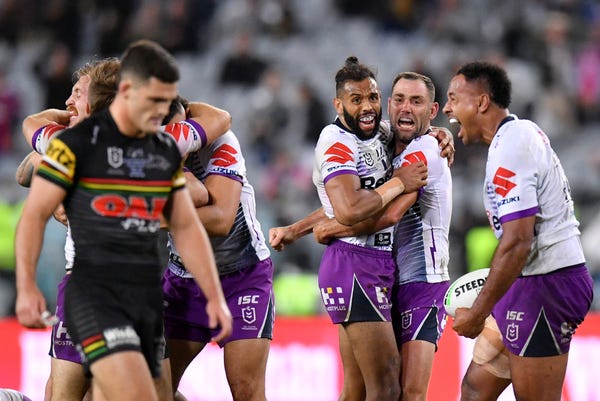
Jason and Oscar are linking up on a Monday to compile a Take the Two and Repeat Set hybrid wrap of each week through to the Grand Final.
Here’s your Repeat Set for the 2020 NRL Grand Final:
The Perfect Storm
Big NAS
Goodbye Penrith Panthers
There’s always next season for…Penrith
Play of the Round: Ryan Papenhuyzen
Graham Annesley’s Briefing Summary
The Perfect Storm
More than a few hours of breaking down Penrith’s form in the lead up to Sunday’s Grand Final had me leaning towards the Mountain Men when I wrote my tip last week, but a dominant first half from the Melbourne Storm - the ultimate professionals in our great game - quickly brought me back to reality.
The Storm are just too good.
Not even an error from the kickoff threatened to derail Melbourne’s 2020 Premiership campaign, as they dominated all areas of the match in the opening 40 minutes to give Penrith almost no chance of a second-half comeback.
Leading roles from Cameron Smith and his forward pack through the middle went a long way to deciding the result on Sunday, but it was the performance of Jahrome Hughes and Ryan Papenhuyzen in particular that stole the show for me, as the pair capped off an incredible season in their respective positions.

It’s hard to believe that a little over twelve months ago, Papenhuyzen was well down the pecking order of fullbacks waiting for their crack at the #1 jersey down in Melbourne. Hughes himself was merely filling that role out the back while Brodie Croft and Ryley Jacks jostled for the halfback position before he moved into the halves late in the season with mixed results. Fast-forward to Sunday’s Grand Final, and Papenhuyzen is celebrating a premiership victory and State of Origin call up after being best on ground in the decider, with Hughes arguably the next-best pick.
Perhaps the most impressive factor of Hughes’ development into a top-tier NRL halfback is that the Kiwi international didn’t play to his strengths on Sunday night, and yet was still so effective.
Arguably at his best when running the footy or playing off-the-cuff, Hughes played his required role as an organising halfback to perfection. His kicking game was superb - he consistently had Dylan Edwards working directly off his own try-line with yardage kicks like this:
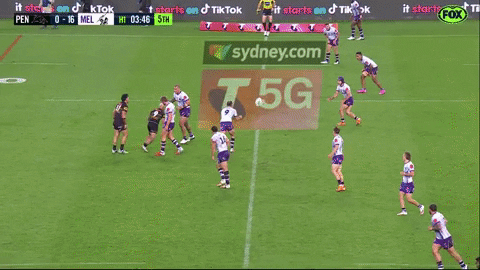
Off the back of Hughes’ kicks, the Storm were able to lock-in in defence and suffocate Penrith coming out of their own end until eventually, it forced mistakes:
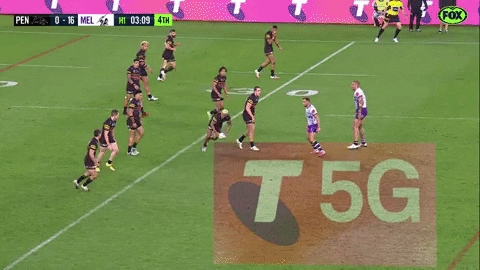
In good ball sets Hughes showed a control and poise to his game that was not apparent this time last year, steering his team around the park and taking the right options more often than not. He isn’t credited for a try assist in Sunday’s game, but the Storm should have scored off the back of Hughes’ combination with Felise Kaufusi in this instance, and quite possibly a few others:
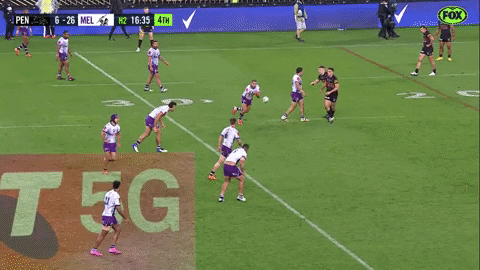
And in defence, Hughes has consistently measured up to the infamously high defensive standards that Craig Bellamy holds his halves to - just ask Brodie Croft.
The Melbourne Storm were a brick wall on their own line on Sunday night. Midway through the first half and defending multiple sets, the Storm came up with three consecutive try saving efforts to maintain their narrow lead. Liam Martin’s hard decoy close to the line drew in Justin Olam and suddenly Penrith had the numbers on the edge, but Josh Addo-Carr and Papenhuyzen did just enough to slow the ball up before Edwards is stopped agonisingly close to the line:
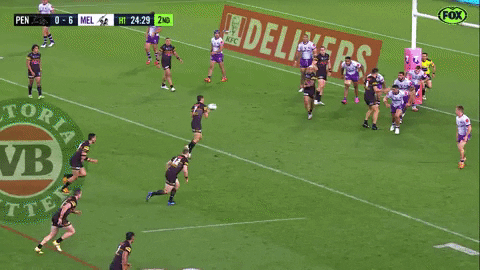
Cleary immediately swung it left, and when Viliame Kikau pushed off that big left foot step the Panthers looked certain to score again, only for Brenko Lee’s second effort to pull down the big Fijian:
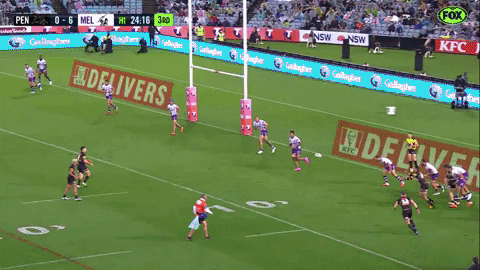
Kikau earned a lightning-quick play the ball and when Jarome Luai went left again to Stephen Crichton it looked a case of ‘third time lucky’ for Penrith, only for Hughes to make a crucial stop in the corner and hold Crichton up to stop a certain try. Hughes’ involvement in this sequence might seem minor, but if he slips off this last tackle then all the work from his teammates in the lead up is undone. You could almost hear the air fizz out of Penrith’s tyres:
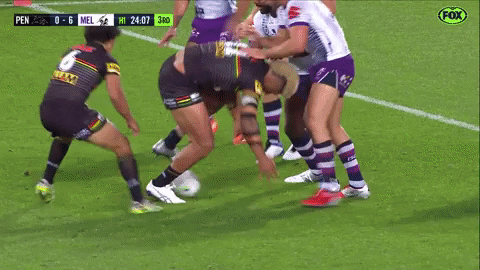
As Hughes guided his team around the park - albeit with some help from a bloke named Cameron Smith - Papenhuyzen was left to pick and choose his moments. And boy, does this kid have timing.
Papenhuyzen was everywhere. His solo effort to stop a Nathan Cleary kick-for-touch and win possession for his team as the Panthers sniffed a comeback was topped only by his length of the field solo try early in the second half. I’ll let Jason break it down in our Play of the Round segment below, but for now just sit back and enjoy:
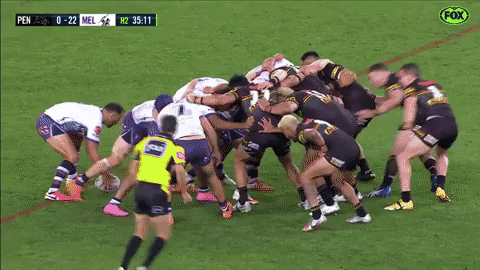
There isn’t another fullback in our game today that could make this look so easy. The ball out in front, sitting so comfortably in two hands. The balance and the turn of pace.
The way Papenhuyzen straightens to square up defenders - in this case Martin and Cleary - has all the makings of an elite ballplayer, and the smoothness with which he accelerates into space makes him not only one of the most dangerous attacking fullbacks in the NRL, but surely the most pleasing to watch, too.
Whether Smith goes around for another year is still a mystery - and one I personally am in no rush to solve. There’s little mystery surrounding the rest of the Storms’ spine moving forward, however. In Papenhuyzen, Hughes and Cameron Munster, Melbourne have ‘The Next Big Three’ ready and waiting to lead this club into the next chapter, and if their performances on Sunday are anything to go by then Melbourne’s success looks set to continue.
~ Oscar
Big NAS
Ryan Papenhuyzen is a deserving winner of the Clive Churchill Medal, but Nelson Asofa-Solomona could have had his name announced without a raising of eyebrows.
The giant middle forward threw his weight around on Sunday night. He had an eye for Isaah Yeo in defence and at times went searching down the right side for runs aimed directly at Jarome Luai. The smaller the man, the more NAS wound up.
Melbourne needed an enforcer to match it with Penrith in the middle and Asofa-Solomona provided.
Asofa-Solomona’s excellent performance doesn’t show in the numbers. His 118 running metres aren’t the most in his side let alone in the match. Six teammates made more than his 25 tackles too. While his 59 post-contact metres and six tackle breaks go a way to painting the picture of his physical 43 minutes, it’s the little things where he made his mark.
With a 16-0 lead and the Panthers looking to last through to halftime, Asofa-Solomona’s defensive effort in the middle helped force an error which soon led to another Storm try.
He first crunched Dylan Edwards to force the Panthers to work it out from their own 10-metre line on this set. The bone-cruncher slowed down the start of the set with Brian To’o unable to push through the next tackle like he often has this season:
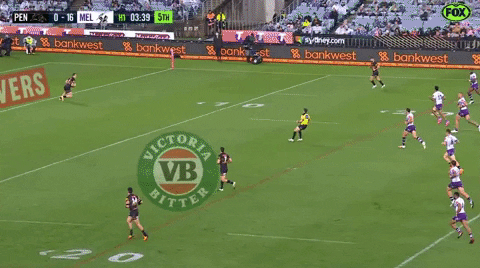
The big lock forward then got low to the ground while chopping down Josh Mansour and Yeo in back-to-back tackles:
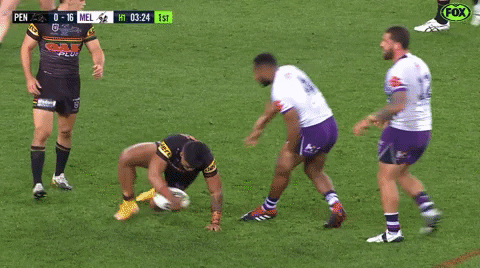
Now just 30 metres from their own line on 4th tackle, Penrith went searching out wide with Tyrone May’s pass failing to find To’o on the right wing.
While Melbourne didn’t score straight away, Asofa-Solomona’s set in defence gave them the field position to attack. It was his run towards little Edwards defending at A that got the Storm on the front foot and forced a rash play from Api Koroisau:
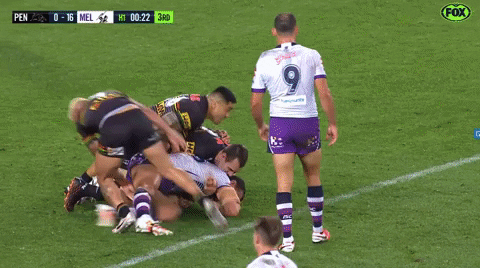
Smith colleted the lose ball to fall over the line and make it 22-0 at the break. A hearbreaker for the Panthers, but a reward for effort for Asofa-Solomona.
Despite only playing 43 minutes, a lot of Melbourne’s best came with Asofa-Solomona on the field. His strong carries and overall presense later helped Papenhuyzen produce the Play of the Round.
~ Jason
Goodbye Penrith Panthers
The Storm were the better team on the night and deserving premiership winners, but what will have hurt Ivan Cleary the most is that Penrith beat themselves on Sunday. After dominating the competition all year in completion and possession statistics, the Panthers completed just 31 of 46 sets in the big dance - a meagre 67% and a far cry from their 81.6% season average.
It made for frustrating and unfamiliar scenes as Penrith found themselves chasing points and out of rhythm for most of the match. Viliame Kikau’s numbers are somewhat of an analogy for Penrith as a whole on Sunday; he looked likely with 117 running metres and 7 tackle busts on the night, but five handling errors - often immediately following a barnstorming run - released any pressure he and the Panthers looked to build.
A fresh set in Melbourne’s territory early in the second half gifted Penrith a rare attacking chance, and they worked upfield with Liam Martin who pushed through the tackle to get the Storm retreating:
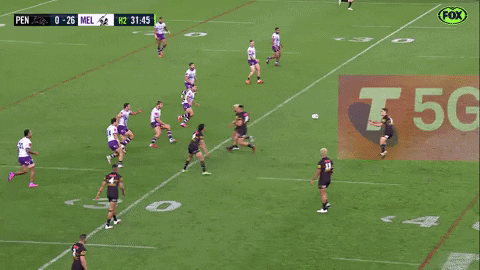
Penrith quickly shift left through Jarome Luai to Kikau, who with a full head of steam charges into the defensive line, winning the contact and finding his front to put Penrith on the attack. It’s only second tackle here - with just two carries Penrith had Melbourne on the back foot and looked ready for the knock out punch - but Kikau fumbles the ball in the ruck to kill any momentum:
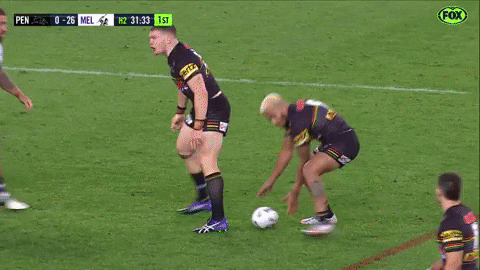
It was a game plan the Panthers looked to again later in the game, and a plan that worked well when executed properly - roll upfield on one edge before shifting to their strike players on the left flank. A wide searching raid down the right edge saw Nathan Cleary and Brent Naden link up for en extra 30 metres and get Melbourne’s defensive line retreating:
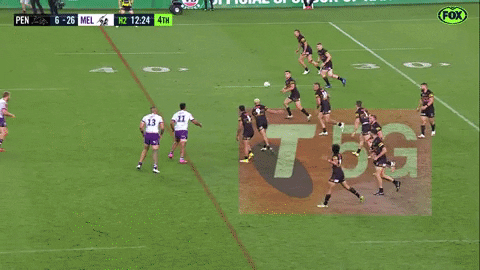
Off the back of this field position, the Panthers again worked from right to left to give Crichton early ball and some room to move down the left channel. He made it count:
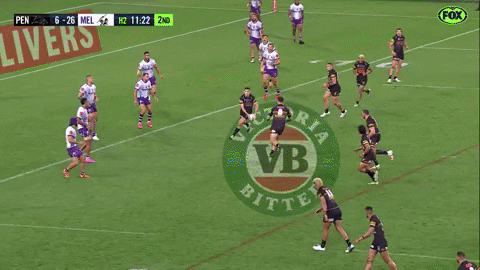
But that’s about as clinical as it got for the Panthers, in the game that mattered most.
You could put it down to inexperience or nerves. Or maybe the fact that it was the first time in eighteen weeks Penrith were forced to chase points. For whatever reason, poor execution proved a problem for the Panthers on Sunday - Crichton’s obstruction line in the lead up to Josh Mansour’s disallowed try early in the first half, for example, was not a mistake we’ve seen Penrith make throughout their incredible winning streak.
Jason has had a keen eye on Penrith’s scoring efficiency this season, and it again proved to be a problem for the Panthers on Sunday night.
If you consider Isaah Yeo’s very controversial try-assist for Brian To’o’s four-pointer in the corner and the fact that Cleary’s 79th minute try was scored with two Storm players in the sin-bin, then the Panthers’ other two tries from a whopping 39 play-the-balls inside Melbourne’s 20m line is decidedly poor. While this is in part due to the elite defensive systems of the Melbourne Storm, some of the blame here must go to Penrith’s primary creative players.
Perhaps because of this, there has been plenty of criticism levelled at Cleary - and Luai to a lesser extent - in the aftermath of Sunday’s game. It’s to be expected. More than that, it’s just lazy commentary. Losing playmakers are easy targets and often - as is the case here - not the sole reason for the result.
You don’t have to dig deep to find reasons why Cleary and Luai weren’t at their creative, attacking best.
Not a single forward in Penrith’s starting pack managed their season average running metres on Sunday night. Live-wire hooker Apisai Koroisau was limited to just eight runs for 32 metres and no tackle breaks. The bench trio of Moses Leota, Zane Tetevano and Kurt Capewell failed to maintain the rage that saw Penrith’s forward rotation lead the competition in run metres and post-contact metres this season.
Despite this, the Panthers still finished within a converted try of what is arguably the most successful club in the modern NRL era. No side with Cameron Smith in it loses a grand final after taking a 22 point lead into the sheds at halftime - he just wouldn’t allow it to happen. For the Panthers to fight back and make it a close finish says a lot about their championship qualities, especially considering they had little to no experience coming from behind in games this season.
The dark horse tag has long been shed for this Panthers side. With their squad virtually unchanged heading into next season, there will be plenty of expectations for Penrith to go one better in 2021.
~ Oscar
There’s always next season for…Penrith
When the Storm fluffed the games opening kickoff to turn the ball over on their own 10-metre line I commented, “that won’t rattle them, they will be fine.”
After all, they’re expertly coached and have Cameron Smith - who is as good as having Craig Bellamy on the field - to settle things down and get things back on track no matter the result of the ensuing defensive set.
I didn’t have that same feeling for the Panthers as they conceded an early try. It didn’t help that Josh Mansour’s answer shortly after Justin Olam scored was waved away either. Things just weren’t happening for the Panthers early on and that frustration later turned into desperation. The expectation for Penrith to weather the storm and come out the other side wasn’t there for me like it was Melbourne.
While the Storm chipped away at the scoreboard with two penalty goals, the Panthers had the better opportunities to score throughout the middling minutes of the first half. They finished the 40 minutes with 24 tackles inside the opposition 20-metre line to Melbourne’s 16. We’ve talked about their inefficiencies in good ball areas here before, and as the scoreboard began to drift away and chances continued to go begging, Nathan Cleary went searching for a play that wasn’t there.
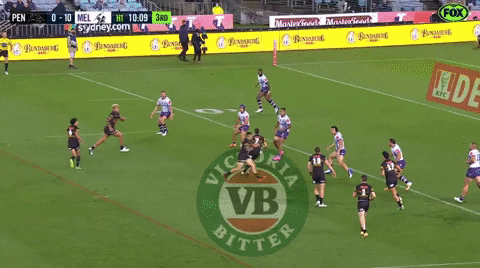
A previously patient Panthers side, one that led the NRL in forced drop outs and completed more tackles inside the opposition 20-metre line than any other in 2020 went away from what had worked for so long and paid a massive price.
But I say all of that to say this: The 2020 Grand Final is a learning experience for the Panther pups.
They did everything they could to say the right things in the build-up to the game and at least gave the impression they were comfortable. However, when push came to shove, their inexperience showed. There isn’t a team in the competition better placed to capitalise on an inexperienced group on the back foot in a Grand Final than the Storm.
But as we look towards 2021, James Tamou is the only player in the Grand Final side not returning to start the preseason (assuming Tyrone May is re-signed). The core will remain, and for the most part, improve.
Cleary, in particular, will learn from Sunday’s loss.
James Fisher-Harris looked as though he wanted a rematch then and there after leading all forwards in the match with 137 running metres.
Viliame Kikau set a new career-high in errors with five on Sunday night - he won’t do that next time.
Isaah Yeo has found his best position as he enters the prime years of his career.
Jarome Luai has come along leaps and bounds; he will become more familiar with his role and when he needs to make a move or slow things down.
Stephen Crichton is one of the most exciting young players in the competition.
I could go on.
Penrith have an excellent squad. It’s one that will at least be competitive over the next two or three seasons if they don’t lift the trophy once or twice. The players will be disappointed now, but it won’t be long before a reflection on the match leads to excitement and motivation for 2021.
They’re the bookies’ early favourites for the premiership and will be a leading contender for us here at RLW come preseason preview time next year.
~ Jason
Play of the Round
It’s the play that secured the Clive Churchill Medal for Ryan Papenhuyzen.
We saw Melbourne try it on earlier in the match. With Tino Fa’asuamaleaui coming underneath Papenhuyzen has he moves across the field, the Storm fullback is only ever running it here. Justin Olam and Josh Addo-Carr - perhaps by design - are too far back to do anything other than attract attention out wide:
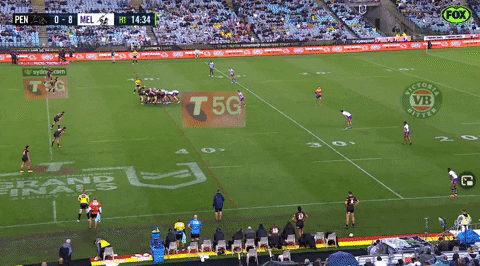
From a similar position on the field but with Asofa-Solomona beside him this time, the pair are a lot tighter than the last time they ran this play. That keeps Cleary from sliding, and despite turning into help last time, May keeps his body directed toward Olam - again sitting very deep.
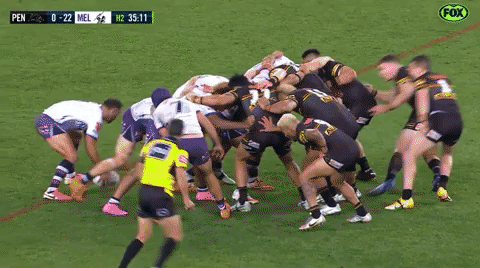
After shaping inside to Asofa-Solomona, Papenhuyzen puts on the afterburners to straighen up in the blink of an eye. Remarkably, he skips through the line without a hand laid on him:
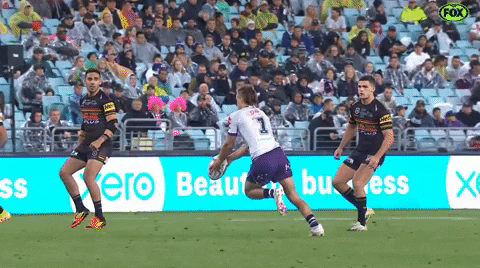
It was a dagger to the hearts of the Panthers and their fans, but a superb individual effort for the neutral to enjoy. Strangely, a lot of the people calling to “bring back the little man” are also calling for scrums to be scrapped…
~ Jason
Annesley’s non-Briefing Summary
Thankfully, Graham Annesley wasn’t forced into an impromptu briefing like he was last season. Despite some of the commentary suggesting otherwise, the 2020 Grand Final was controversy-free.
Justin Olam’s penalty try is about as clear as they come for that sort of infringement.
The obstruction call on Stephen Crichton shortly after is a dictionary definition.
While the decision to award Brian To’o a try despite what looked like a clear obstruction before Isaah Yeo’s kick created comment, it will fly under the radar given the result. As somebody that has watched every briefing Annesley has done since he started checking in every Monday, it’s the sort I would tip him to sit on the fence with. Something along the lines of ‘it’s a judgement call’ and an acceptance that others will disagree with the ruling.
~ Jason
Subscribe to Rugby League Writers: Two articles on a Monday to recap the round, and another two on Thursday to preview the next one.
Socials
Rugby League Writers on Twitter, Facebook & Instagram
Jason Oliver on Twitter & Facebook
Oscar Pannifex on Twitter




